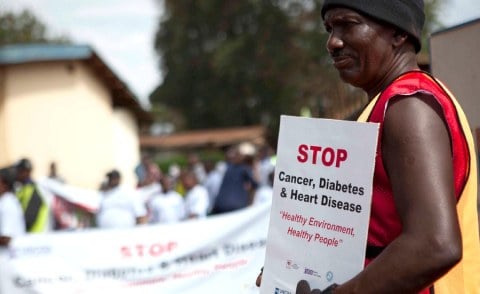Africa: Experts Examine How to Reduce Deaths from Major Killer Diseases

Researchers, scientists, physicians and stakeholders gathered in Paris February 2 and 3 for the International Conference on Harm Reduction in Non-Communicable Diseases (NCDs).
Harm reduction focuses on how to diminish the impact on health of behaviors such as drinking alcohol, smoking cigarettes or the lack of physical activity. Non-communicable diseases (NCD) – those not transmissible directly from one person to another – include most cancers, cardiovascular illnesses and diabetes. NCDs result from a combination of genetic, physiological, environmental and behavioral factors.
According to the World Health Organization (WHO), NCDs – which affects every country – claims 41 million people each year worldwide, 71% of all deaths globally. Cardiovascular diseases account for 17.9 million deaths, according to WHO, cancers 9 million), respiratory diseases 3.9million and diabetes 1.6 million.
Tobacco alone causes 7.2 million deaths every year – but from smoking and from exposure to second-hand smoke, and this number is projected to rise markedly.
Conference participants discussed how NCDs can be prevented. All main risk factors are known and most of them are avoidable. One innovative but controversial alternative currently being tried is ‘heat-not-burn’ tobacco promoted by Philip Morris International. The company has announced plans to move towards ending manufacture and commercialization of cigarettes, replacing them with smoke-free products.
Experts attending the Paris conference agreed on the urgency to promote the lifestyle changes which many argue is the most effective way to minimize the health burdens of many chronic diseases. Appropriate diet and prevention of NCDs are closely related.
Without political will, non-communicable diseases will continue to kill more and more people
For instance, in Japan, long life expectancy – on average 87 for women and 81 for men – is largely attributed to healthy diet. The country also registers the lowest obesity rate, which stands at 4.3%.
The situation in Africa
Eighty percent (80%) of premature deaths caused by NCDs occur in low- and middle-income countries, according to WHO. Africa is one of the most affected continents with several types of cancers, including lung, cervical and stomach, that are spreading fast.
According to Dr Judith Didi Kouko Coulibaly, an oncologist and Director of the National Oncology and Radiotherapy Center in Abidjan lack of easy access to radiotherapy, poor prevention policies and late diagnoses are some of the main causes for proliferation of the diseases.
In, Côte d’Ivoire, cervical and breast cancers are at an all-time high, she said. Abidjan, the capital city, is home to one of very few radiotherapy centers in Sub-Saharan Africa.
This center, which opened in January 2018, demonstrates government commitment to reduce cancer rates, according to Dr Coulibaly who believes governments have a critical role to play. “Without political will, the situation will not change”, she says.
The researchers, scientists, physicians and stakeholders gathered in Paris February 2 and 3 for the International Conference on Harm Reduction in Non-Communicable Diseases (NCDs).
Harm reduction focuses on how to diminish the impact on health of behaviors such as drinking alcohol, smoking cigarettes or the lack of physical activity. Non-communicable diseases (NCD) – those not transmissible directly from one person to another – include most cancers, cardiovascular illnesses and diabetes. NCDs result from a combination of genetic, physiological, environmental and behavioral factors.
According to the World Health Organization (WHO), NCDs – which affects every country – claims 41 million people each year worldwide, 71% of all deaths globally. Cardiovascular diseases account for 17.9 million deaths, according to WHO, cancers 9 million), respiratory diseases 3.9 million and diabetes 1.6 million.
Tobacco alone causes 7.2 million deaths every year – but from smoking and from exposure to second-hand smoke, and this number is projected to rise markedly.
Conference participants discussed how NCDs can be prevented. All main risk factors are known and most of them are avoidable. One innovative but controversial alternative currently being tried is ‘heat-not-burn’ tobacco promoted by Philip Morris International. The company has announced plans to move towards ending manufacture and commercialization of cigarettes, replacing them with smoke-free products.
Experts attending the Paris conference agreed on the urgency to promote the lifestyle changes which many argue is the most effective way to minimize the health burdens of many chronic diseases. Appropriate diet and prevention of NCDs are closely related.
>Without political will, non-communicable diseases will continue to kill more and more people
For instance, in Japan, long life expectancy – on average 87 for women and 81 for men – is largely attributed to healthy diet. The country also registers the lowest obesity rate, which stands at 4.3%.
The situation in Africa
Eighty percent (80%) of premature deaths caused by NCDs occur in low- and middle-income countries, according to WHO. Africa is one of the most affected continents with several types of cancers, including lung, cervical and stomach, that are spreading fast.
According to Dr Judith Didi Kouko Coulibaly, an oncologist and Director of the National Oncology and Radiotherapy Center in Abidjan lack of easy access to radiotherapy, poor prevention policies and late diagnoses are some of the main causes for proliferation of the diseases.
In, Côte d’Ivoire, cervical and breast cancers are at an all-time high, she said. Abidjan, the capital city, is home to one of very few radiotherapy centers in Sub-Saharan Africa.
This center, which opened in January 2018, demonstrates government commitment to reduce cancer rates, according to Dr Coulibaly who believes governments have a critical role to play. “Without political will, the situation will not change”, she says.
Seynabou Sall reported from Paris and Sebastien Satigui from Nairobi
Source: All Africa





